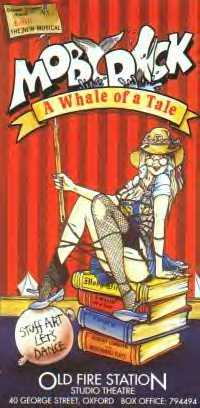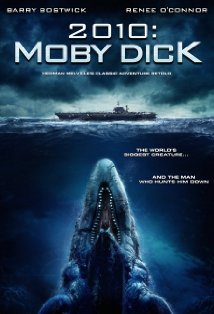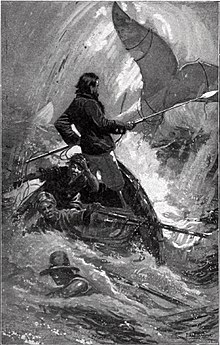
Moby-Dick; or, The Whale is an 1851 novel by American writer Herman Melville. The book is the sailor Ishmael's narrative of the maniacal quest of Ahab, captain of the whaling ship Pequod, for vengeance against Moby Dick, the giant white sperm whale that bit off his leg on the ship's previous voyage. A contribution to the literature of the American Renaissance, Moby-Dick was published to mixed reviews, was a commercial failure, and was out of print at the time of the author's death in 1891. Its reputation as a Great American Novel was established only in the 20th century, after the 1919 centennial of its author's birth. William Faulkner said he wished he had written the book himself, and D. H. Lawrence called it "one of the strangest and most wonderful books in the world" and "the greatest book of the sea ever written". Its opening sentence, "Call me Ishmael", is among world literature's most famous.

Ishmael is a character in Herman Melville's Moby-Dick (1851), which opens with the line "Call me Ishmael." He is the first-person narrator of much of the book. Because Ishmael plays a minor role in the plot, early critics of Moby-Dick assumed that Captain Ahab was the protagonist. Many either confused Ishmael with Melville or overlooked the role he played. Later critics distinguished Ishmael from Melville, and some saw his mystic and speculative consciousness as the novel's central force rather than Captain Ahab's monomaniacal force of will.

Jake Heggie is an American composer of opera, vocal, orchestral, and chamber music. He is best known for his operas and art songs as well as for his collaborations with internationally renowned performers and writers.

Pequod is a fictional 19th-century Nantucket whaling ship that appears in the 1851 novel Moby-Dick by American author Herman Melville. Pequod and her crew, commanded by Captain Ahab, are central to the story, which, after the initial chapters, takes place almost entirely aboard the ship during a three-year whaling expedition in the Atlantic, Indian and South Pacific oceans. Most of the characters in the novel are part of Pequod's crew.

Moby Dick is a 1956 period adventure drama film directed and produced by John Huston, adapted by Huston and Ray Bradbury from Herman Melville's 1851 novel Moby-Dick. It stars Gregory Peck as Captain Ahab, Richard Basehart as Ishmael, and Leo Genn as Starbuck, with supporting performances by James Robertson Justice, Harry Andrews, Friedrich von Ledebur, Bernard Miles, Noel Purcell and Orson Welles. The film was a co-production of the United Kingdom and the United States.

Moby Dick is a musical with a book by Robert Longden, and music and lyrics by Longden and Hereward Kaye, first staged in 1990. The plot follows the anarchic and nubile girls of St. Godley's Academy for Young Ladies who, determined to save the institution from bankruptcy, decide to stage Herman Melville's classic 1851 novel in the school's swimming pool. The musical is a mixture of high camp, music hall-style smut, and wild anachronism overflowing with double entendres; the lead role of headmistress/Captain Ahab is portrayed by a man in drag.
Moby-Dick is an 1851 novel by Herman Melville that describes the voyage of the whaleship Pequod, led by Captain Ahab, who leads his crew on a hunt for the whale Moby Dick. There have been a number of adaptations of Moby-Dick in various media.

The Sea Beast is a 1926 American silent drama film directed by Millard Webb, starring John Barrymore, Dolores Costello and George O'Hara. The film was a major commercial success and one of the biggest pictures of 1926 becoming Warner Brothers' highest grossing film. The Sea Beast is the first adaptation of Herman Melville's 1851 novel Moby-Dick, a story about a monomaniacal hunt for a great white whale. However, the film alters the novel's plotline by establishing prequel and sequel elements that are not in the original story—such as the romancing of Esther and Ahab's safe return, respectively—and substitutes a happy ending for Melville's original tragic one. Some of the characters in the film do not appear in Melville's original novel. The film was so successful that in 1930 Warner Bros redid it in English and German, under the title Moby Dick, with Joan Bennett taking the role of Ahab's love because Dolores Costello was pregnant at the time.

Moby Dick is a 1930 American pre-Code film from Warner Bros., directed by Lloyd Bacon, and starring John Barrymore, Joan Bennett and Walter Lang. The film is a sound remake of the 1926 silent movie, The Sea Beast, which also starred Barrymore. It is the first film adaptation of Herman Melville's 1851 novel Moby Dick that includes a soundtrack.
Stephen John Costello is an American operatic tenor and a recipient of the 2009 Richard Tucker Award. Costello has performed in noted opera houses around the world including Covent Garden, Metropolitan Opera, and Lyric Opera of Chicago. In 2010, Costello originated the role of Greenhorn (Ishmael) in the world premiere of Jake Heggie's Moby-Dick at the Dallas Opera.

Moby Dick is a 2010 film adaptation of Herman Melville's 1851 novel Moby-Dick. The film is an Asylum production, and stars Barry Bostwick as Captain Ahab. It also stars Renee O'Connor, Michael B. Teh, and Adam Grimes and is directed by Trey Stokes.

Age of the Dragons is a 2011 fantasy film directed by Ryan Little and starring Danny Glover and Vinnie Jones. A fantasy-themed reimagining of Herman Melville's classic 1851 novel, Moby Dick, it was released in the United Kingdom on March 4, 2011.
Moby Dick is a Canadian-German television miniseries based on Herman Melville's 1851 novel of the same name, produced by Tele München Gruppe, with Gate Film, In association with RTH/ORF. Starring William Hurt as Captain Ahab, it was directed by Mike Barker with a screenplay by Nigel Williams. The cast also includes Ethan Hawke as Starbuck, Charlie Cox as Ishmael, Eddie Marsan as Stubb, Gillian Anderson as Ahab's wife, Elizabeth and Donald Sutherland as Father Mapple.

Moby Dick is a 1998 American television miniseries directed by Franc Roddam, written by Roddam, Anton Diether, and Benedict Fitzgerald, and executive produced by Francis Ford Coppola. It is based on Herman Melville's 1851 novel of the same name. It was filmed in Australia in 1997 and first released in the United States in 1998. The miniseries consisted of two episodes, each running two hours with commercials on March 15 and 16 of 1998 on the USA Network. This is Gregory Peck's final on-screen role.
Gene Scheer is an American songwriter, librettist and lyricist. Brother to Samuel Scheer, an English teacher at Windsor High School and part-time musician.

Captain Ahab is a fictional character and one of the protagonists in Herman Melville's Moby-Dick (1851). He is the monomaniacal captain of the whaling ship Pequod. On a previous voyage, the white whale Moby Dick bit off Ahab's leg, and he now wears a prosthetic leg made out of whalebone. The whaling voyage of the Pequod ends up as a hunt for revenge on the whale, as Ahab forces the crew members to support his fanatical mission. When Moby Dick is finally sighted, Ahab's hatred robs him of all caution, and the whale drags him to his death beneath the sea and sinks the Pequod.
Bulkington is a character in Herman Melville's 1851 novel Moby-Dick. Bulkington is referred to only by his last name and appears only twice, briefly in Chapter 3, "The Spouter Inn", and then in Chapter 23, "The Lee Shore", a short chapter of several hundred words devoted entirely to him.
Pip, short for Pippin, is the African-American cabin-boy on the whaling-ship Pequod in Herman Melville's 1851 novel, Moby-Dick. When Pip falls overboard he is left stranded in the sea, and rescued only by chance and becomes "mad." The book's narrator, Ishmael, however, thinks that this "madness" gives Pip the power to see the world as it is. Pip is first described as "insignificant," but is the only member of the crew to awaken feelings of humanity in Ahab, the ship's monomaniacal captain.
Moby Dick was a 1954 American television movie. Adapted from the novel Moby Dick by Herman Melville it aired as an episode of Hallmark Hall of Fame.











